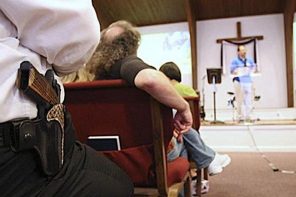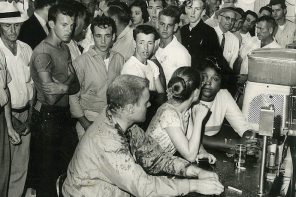As we enter the stretch of the 2008 presidential race, my breath catches. Often. I feel just as I did as a 15-year-old boy in a darkened bedroom, transistor radio to my ear, early Christmas Eve morning, 1968. That’s when I lost contact with the three Apollo 8 astronauts as they disappeared into radio blackout during their 32-minute crossing of the far side of the Moon [video at the article’s end].
Back in ‘68 it was the sudden silencing of my heroes’ voices that caused a kind of spiritual embolism of the heart. This election season it’s the campaign racket of hate that takes my breath away. Forty years ago, it was heart-stopping radio quiet. This year it’s punishing white noise. As we enter the final period, the big, visible tactical moves have been launched. The near-invisible work of the ground game will kick in as the national noise grows louder. It’s nerve-wracking.
While America is awash in John McCain and Sarah Palin’s hysterical charges that Barack Obama is a terrorist of suspect color and dangerous “associations,” the nation of India launches a mission to the Moon today—a telling juxtaposition of national circumstance.
It seems long, long ago that Walter Cronkite, lifted by awe and humility, looked at the astronauts’ television pictures of Earth as seen from the moon and stammered, “There she is, floating in space.” In stark contrast, today’s talking heads achieve neither awe nor humility. There are exceptions, but most are captured and made insecure by a cruel and irresponsible corporate media bazaar that demands fealty to its barons and their political allies. They are carnival barkers who won’t shut up.
For those too young to remember that first manned mission to the Moon, those 30-plus seconds of silence seemed like a message from God that reinforced the hopes of those years, hopes that seemed under constant assault. Suspended, however briefly, was news of assassination and riot, of the gruesome spectacle of wars, hot and cold. But we also knew that during that silence the fate of astronauts James Lovell Jr., William Anders and Frank Borman would be decided. Hidden from us by the Moon, the astronauts would undertake the maneuver that placed them in lunar orbit. If something went wrong precisely at the time we couldn’t watch or hear, they would be lost to space forever.
Our first indication that all was well was the Quindar radio beep sent home from the spacecraft as it emerged from the shadow of the Moon. The beep came right on time; the astronauts’ dark-side transit had been a success. I could breathe again.
A little less than two months earlier, Richard Nixon had defeated Hubert Humphrey for president. Nixon pioneered the media-age campaign of fear. He perfected Joe-the-Plumber politics of racial division, class bitterness, and the valorization of ignorance.
It was as if the ruling class decided that the public was too inspired. A hopeful and energized populace was unruly and hard to control. We had, I guess, been a little rebellious, though never so dangerously out-of-control as a Nixon Flu-infected media still likes to pretend. Not long after our first trips to the Moon, American soldiers shot down American students at Kent State. There was the secret bombing of Cambodia. The Watergate break-in. The first international oil embargo and the disappearance of cheap gas. The US embassy rooftop retreat in Saigon. Disco. Nixon’s resignation took out a symbol of corruption, but the demoralizing corruption lived on.
It is not surprising, then, that the nation’s anxiety was marked by a turn to religion, even if that turn was unexpected. Some protestant mainline churches that had been engaged in the civil rights movement, well, moved on. Evangelical churches swelled with membership. The political right began to organize in those churches during this very time. There was comfort there, a sense of community. As Americans’ hope diminished, the growing right-wing churches provided answers.
It seems to me that America faces a moment of truth not unlike the Apollo 8 astronauts faced on their first trip around the Moon. If we get it right, we might emerge from a 30-plus year shadowland of selfishness, corruption and authoritarian rule. Good evidence of the possibility might be found in the liberalizing spirit among some right-leaning churches whose leaders and membership have turned outward, addressing global warming and poverty, for instance.
Unlike the night Apollo 8 orbited the moon, there’s no heartening silence to mark the moment, only the shrill braying of campaign hacks, special interests, and the ubiquitous sideshow clowns of network and cable news. Like I said, it’s white noise causing the gasps.
Many Americans have invested their hopes and dreams in the person of Obama. I admire him and his campaign, but I’m realistic enough to know that he is an inspiring though limited human who will, no doubt, be forced to compromise now and again with the political forces of darkness that have ruled our nation these many years. It’s what’s going on in the hearts of my hopeful countrymen that resuscitates. And it’s the blind prejudices of Obama’s detractors, stirred to what are, so far, minor acts of violence by McCain’s campaign of hate, that gives me pause.
The experienced political operative in me tugs me towards pragmatics and superficial analysis. We all knew that eight years of the Bush Administration gave the Democratic nominee such an advantage that the Republican would resort to deceit and character assassination, especially when the Democrat was an African-American and the Republican campaign could exploit the nation’s incipient racism. In circumstances such as the McCain campaign finds itself, political consultants say things like, “We have to blow up the race. That’s our only hope.” In other words, throw neutron brain-bombs that destroy voters’ judgment. Then hope the shrapnel spins your way.
But I am pulled harder in the opposite direction. Something huge, something besides campaign gamesmanship, is at stake this year. I have always been buoyed by a persistent, optimistic faith in human goodness, the result not of will or practice but of some tendency of temperament I can’t seem to escape even when I want to. I have, in the past, used my anger at the divisive manipulations of political authority as motivation. Never have I truly feared the possibility of a triumphant authoritarianism in America. Never have I thought that an enforced know-nothingism might prevail.
Never, until this year. Perhaps the fear is raised by the coincidence of history: a candidate who speaks of empathy, of our responsibilities to one another, of “the audacity of hope,” opposed by a candidate who appears to have abandoned all morality in his pursuit of power. Each has lined their army of supporters. Those armies are so different from one another in their fears and aspirations that it hardly seems possible they are of the same nation.
I have to admit that, until now, the extraordinary power of Abraham Lincoln’s first inaugural address eluded me. Lincoln said:
We are not enemies, but friends. We must not be enemies. Though passion may have strained, it must not break our bonds of affection. The mystic chords of memory, stretching from every battlefield, and patriot grave, to every living heart and hearthstone, all over this broad land, will yet swell the chorus of the Union, when again touched, as surely they will be, by the better angels of our nature.
It was very hard to emotionally grasp the power of those words more than a century after the Civil War, as I never felt the nation was so divided that a president must call us back to friendship. I think we are that divided now.
So the white noise washes over me, and I hold my breath and wait for a beep or beacon of light that will tell me the transit across the far side has been accomplished.
In a terrific new book, Earthrise, historian Robert Poole reminds us that just after Apollo 8 emerged from the far side of the moon, we received one of the most powerful images ever manufactured by man: the image of our Earth from space.
The image was humbling. It gave us a new perspective, while raising again an old insight into the ongoing interaction and tension—nowhere as pronounced as in the American experiment—between the outwardly focused embrace of the Other and an inward gaze that risks an isolated selfishness in its pursuit of self-understanding and fulfillment. Traveling outward, farther than anyone had ever traveled, we focused upon our home.
In a way, a trip to the moon brought us down to Earth. We saw that we cannot secede from one another on this globe. We are all, as the poet Archibald MacLeish said in homage to the illuminations of Apollo 8, “Riders on the Earth.”
The intervening years have not been kind to our polity, largely because a healthy and inspired national introspection, coupled with a courageous openness to adventure beyond our doorsteps, was turned to fear and loathing by ambitious and opportunistic corporate and political leadership.
Is it possible something as profane as the 2008 campaign for president of the United States might return us to the sacred path to the achievement of true democracy?
I have my transistor radio once again to my ear.



